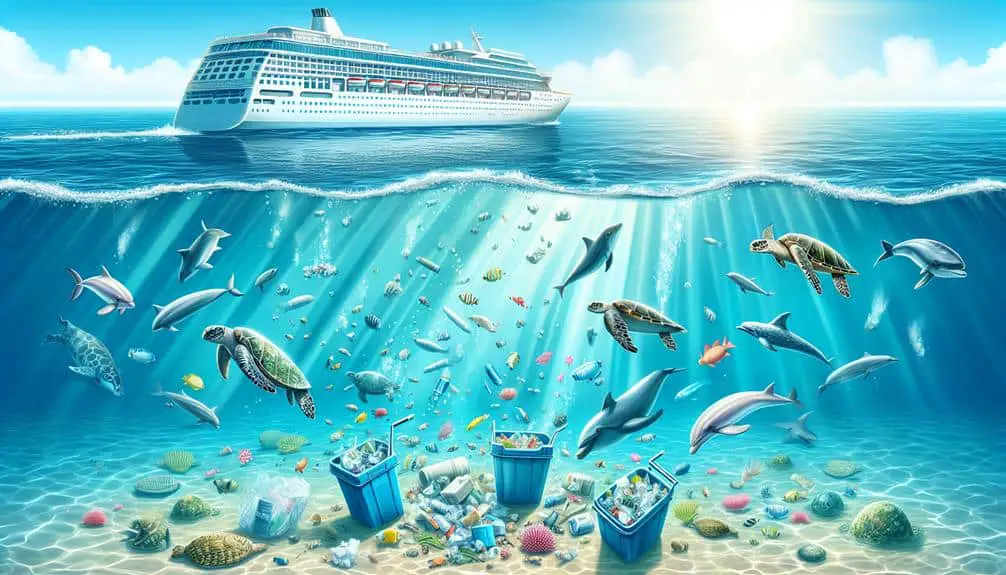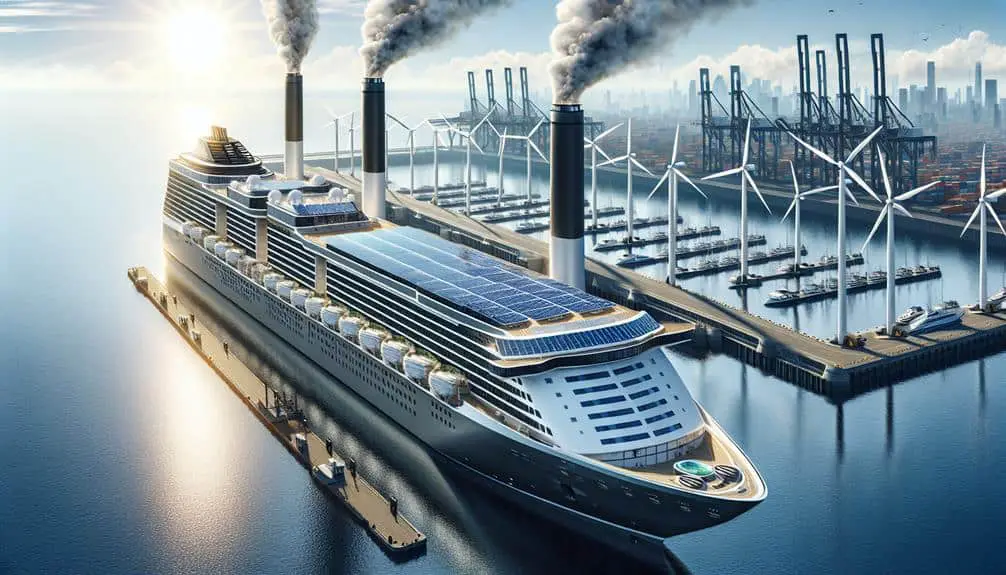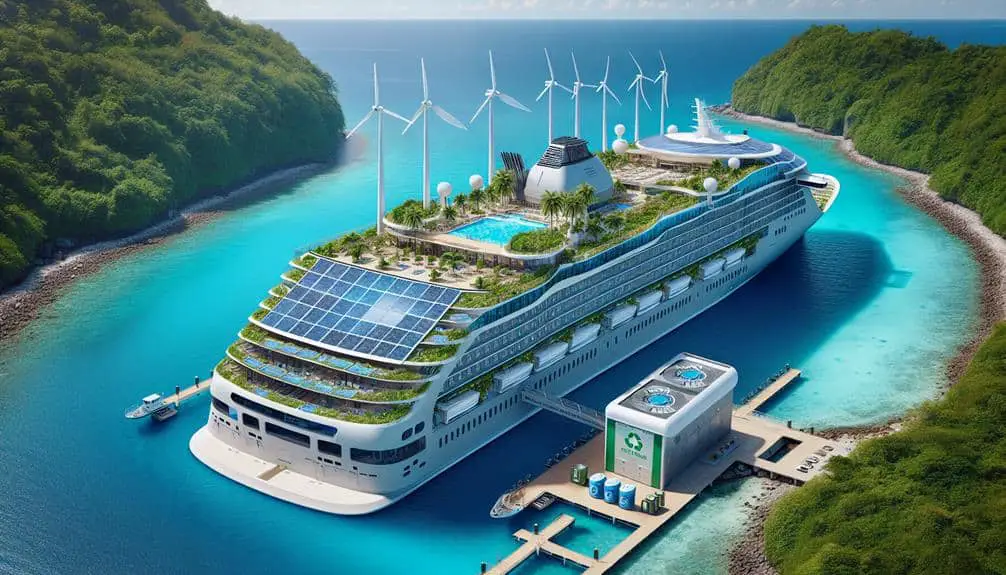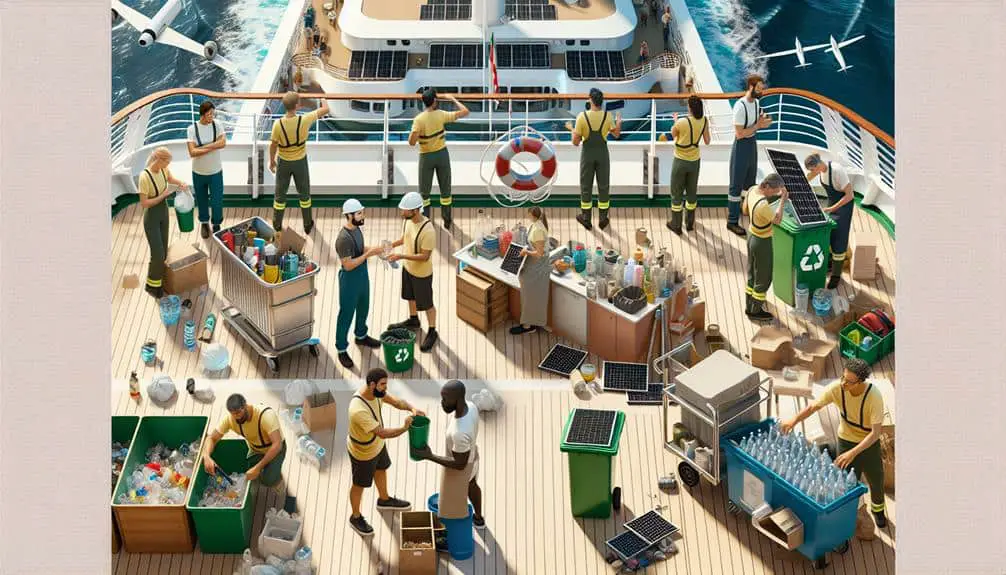Cruise ship waste disposal harms marine life by polluting with sewage, oil spills, and garbage. This affects ecosystem health near cruise routes, leading to water quality decline and biodiversity loss. Fragile coral reefs and coastal areas are at risk. The pollutants disrupt marine ecosystems, leading to habitat destruction and food chain disruption. The damage extends to air quality issues, with emissions impacting the environment and human health. To address these challenges, stricter regulations and essential practices are vital. Understanding the legal and regulatory hurdles in waste disposal can help protect the marine environment from further harm.
Key Points
- Improper waste disposal from cruise ships harms marine life and ecosystems.
- Untreated sewage, oil spills, and garbage dumping pollute marine environments.
- Water quality decreases, disrupting fragile ecosystems and biodiversity.
- Cruise ship waste disposal contributes significantly to coral reef damage.
- Emissions from cruise ships impact air quality and human health.
Marine Life Impact
When cruise ships dispose of waste improperly, marine life suffers from pollution and habitat destruction. Impact evaluations have shown that the ecosystem health of marine environments near popular cruise routes is greatly affected by the release of untreated sewage, oil spills, and garbage dumping. These activities introduce harmful substances into the water, leading to a decrease in water quality and the disruption of fragile ecosystems.
Ecosystem health is a vital aspect of evaluating the overall well-being of marine life. The pollution generated by cruise ships can have devastating effects on the balance of these ecosystems, leading to a decline in biodiversity and the overall health of marine species. In particular, sensitive habitats such as coral reefs and coastal areas are at risk of long-term damage due to the toxic substances released by cruise ships.
To mitigate these harmful effects, it's essential for cruise lines to conduct thorough impact evaluations and implement stringent waste management practices to protect the marine environment from further degradation. By prioritizing ecosystem health and sustainability, the negative impact of cruise ship waste disposal on marine life can be minimized.
Water Pollution Concerns
Water pollution concerns arise due to the vital disposal of waste by cruise ships, posing a significant threat to marine ecosystems and biodiversity. Ecosystem disruption occurs as pollutants such as sewage, oil, and chemicals leach into the water, affecting marine life. The contamination can lead to the destruction of habitats and disrupt the food chain, impacting biodiversity. Additionally, the tourism industry, dependent on pristine environments, can suffer due to polluted waters, affecting local economies.
Public health is also at risk from the ocean contamination caused by cruise ship waste. Pathogens and harmful substances in the water can lead to illnesses in both marine organisms and humans who come into contact with polluted areas. The spread of diseases and the decline in water quality can have far-reaching consequences, emphasizing the importance of proper waste management in the cruise industry. It's vital for cruise lines to adopt sustainable practices to mitigate water pollution and protect the marine environment.
Coral Reef Damage
Cruise ship activities have been identified as a significant factor contributing to the damage observed in coral reefs worldwide. The impact of cruise ships on coral reefs is mainly attributed to reef bleaching and ecosystem destruction. Reef bleaching occurs when corals expel the algae living in their tissues, causing them to turn white and making them more susceptible to disease and death. This phenomenon is exacerbated by the discharge of pollutants from cruise ships, such as sewage, oil, and chemicals, which further stress the coral reefs.
Ecosystem destruction is another consequence of cruise ship activities on coral reefs. The physical damage caused by anchors and chains can directly harm the delicate structures of coral reefs, leading to long-term consequences for the entire ecosystem. Additionally, the pollution from cruise ships can disrupt the balance of marine life within the coral reef environment, impacting various species that depend on the reefs for survival.
To address these issues, stricter regulations and sustainable practices are vital to mitigate the harmful effects of cruise ship activities on coral reefs.
Air Quality Issues
Air quality concerns arise due to emissions from cruise ships, impacting both the environment and human health. The emissions from cruise ships contain pollutants such as sulfur dioxide, nitrogen oxides, and particulate matter, which can contribute to smog formation and have adverse effects on air quality. To address these concerns, cruise ships are increasingly implementing emissions control technologies like exhaust gas cleaning systems (scrubbers) and low-sulfur fuels to reduce harmful emissions. These technologies help minimize the release of pollutants into the air, mitigating the impact on both the atmosphere and human health.
In addition to emissions control measures, ventilation systems on cruise ships play an essential role in maintaining good air quality onboard. Proper ventilation helps to circulate fresh air, remove indoor pollutants, and prevent the buildup of harmful gases and particles. Regular maintenance and monitoring of ventilation systems are vital to ensure excellent air quality within the confined spaces of a cruise ship, safeguarding the health and well-being of passengers and crew members.
Legal and Regulatory Challenges
Addressing the legal and regulatory challenges surrounding waste disposal on cruise ships requires a thorough examination of existing policies and their enforcement mechanisms. Regulatory compliance is essential in ensuring that cruise lines adhere to waste management strategies that protect the environment. However, the complex nature of waste disposal at sea poses unique challenges for regulators.
One key issue is the enforcement of international regulations, as cruise ships often operate in multiple jurisdictions, making it difficult to guarantee compliance with all relevant laws. Additionally, the lack of standardized waste management practices across different regions further complicates regulatory efforts.
To address these challenges, collaboration between governments, cruise lines, and environmental organizations is vital. Developing detailed waste management plans that prioritize sustainability and environmental protection can help improve regulatory compliance within the industry. By implementing stricter enforcement measures and promoting transparency in waste disposal practices, cruise ships can work towards reducing their environmental impact and ensuring a more sustainable future for marine ecosystems.
Frequently Asked Questions
How Much Waste Does a Typical Cruise Ship Generate on a Daily Basis?
On a daily basis, a typical cruise ship generates approximately 8 tons of waste. Waste reduction and recycling initiatives are essential to minimize the environmental impact of this industry. Consider supporting sustainable practices to protect our oceans.
Are There Any Sustainable Waste Disposal Practices Being Implemented by Cruise Lines?
Cruise lines are increasingly adopting eco-friendly technologies like recycling programs and waste reduction initiatives. These sustainable practices help minimize environmental impact and promote responsible waste management. Embracing such measures is essential for a more sustainable future.
What Are the Long-Term Effects of Cruise Ship Waste on the Ocean Ecosystem?
When cruise ship waste enters the ocean, it can have devastating long-term effects on the ecosystem. Impact on biodiversity is significant, with marine pollution causing harm to various species. This poses a serious threat to the delicate balance of ocean life.
How Do Cruise Ships Compare in Terms of Waste Disposal Regulations Compared to Other Industries?
When it comes to waste management regulations, cruise ships often face less stringent rules compared to other industries. This leniency can lead to significant environmental impact as cruise ships generate a substantial amount of waste.
Are There Any Alternative Solutions to Cruise Ship Waste Disposal That Are Being Explored?
Exploring innovative methods like waste recycling onboard can lessen environmental impact of cruise ship waste. Ocean conservation efforts are advancing to protect marine ecosystems. Consider these alternatives for a sustainable future at sea.




